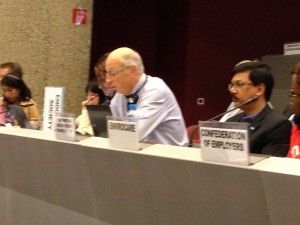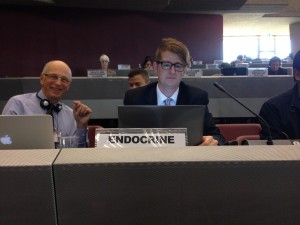During September and October, the Society participated in two important international meetings related to Endocrine Disrupting Chemicals (EDCs). The Society was the only scientific organization participating and, as such, it was able to share the Society’s latest Scientific Statement on EDCs and link health impacts to EDCs, and was seen as a trusted policy advisor.
On September 25 and 26, the Endocrine Society participated in a meeting of the United Nations Environment Programme (UNEP) Advisory Group on the Environmental Exposure and Impact of Endocrine Disrupting Chemicals (EDCs). The EDC Advisory Group was established in May 2014 to “provide strategic and policy advice on approaches related to the implementation of UNEP’s activities concerning environmental exposure and impact of EDCs.” Endocrine Society members Jean-Pierre Bourguignon MD, PhD, and Riana Bornman, MD, DSc, were invited to participate in the meeting based on their expertise on EDCs.
During the meeting, participants heard updates on global EDC-related activities and UNEP introduced a project document on EDCs. The project proposes to focus on the following five activities:
- Overview reports focusing on existing knowledge on exposure, legislation, measures and gaps regarding EDCs
- Situation and gap analysis reports on methodologies and tools for environmental hazard and risk assessment, and environmental exposure assessment of EDCs
- Annual meetings for information exchange about specific topics to be addressed through intergovernmental collaboration
- Awareness-raising materials and a region-specific awareness-raising campaign
- Draft project proposals for case studies with developing and transition countries in multiple UN regions, to assess and manage EDC exposures in those countries
Participants also reviewed and gave feedback on a draft set of awareness-raising materials commissioned by UNEP, consisting of a brochure and infographics on EDCs. The aim of the awareness-raising materials is to educate specific audiences on how to reduce environmental exposures to EDCs in common settings. The Endocrine Society hopes to work with UNEP to raise awareness of EDCs globally, and looks forward to continued engagement as UNEP implements the EDC project.
EDC Resolution Adopted at ICCM4
From September 28 through October 2, the Endocrine Society participated in the 4th International Conference on Chemicals Management (ICCM4) in Geneva, Switzerland. The Conference is the decision-making body of the Strategic Approach to International Chemicals Management (SAICM), a policy framework to promote chemical safety worldwide. The following members represented the Society throughout the conference: Jean-Pierre Bourguignon MD, PhD, Leonardo Trasande, MD, Riana Bornman MD, DSc, and Richard Ivell PhD.

During the plenary sessions of the conference, Endocrine Society members delivered statements describing the key endocrine principles that should be taken into account as national and international regulatory bodies develop strategies to reduce harms associated with exposure to EDCs through various sources. Trasande also participated in a panel discussion during the Conference and delivered a presentation titled “Costs of Inaction — Endocrine Disrupting Chemicals, Disease, and Disability.” Society members also contributed to a resolution on EDCs, which was introduced and subsequently adopted by the Conference. The resolution represents broad consensus agreement by the conference on several important points that are consistent with the Endocrine Society’s positions on EDCs, including:
• Evidence in humans, laboratory animals and wildlife shows that exposure to endocrine-disrupting chemicals can result in adverse effects;
• The most critical window of exposure is during development;
• Exposure during early life stages can result in adult-onset disease, and an important focus should be on reducing exposure;
• There is a “cost of inaction” associated with EDCs exposure;
• Continued actions on endocrine-disrupting chemicals by all stakeholders will be needed in order to attain the objectives of the Strategic Approach; and
• The WHO – UNEP 2012 State of the Science report is authoritative and should be utilized by governments.
ICCM4 participants included representatives from over 100 governments worldwide alongside over 70 Non-Governmental Organizations representing diverse stakeholder interests. The Conference was an important opportunity to advance the Society’s positions on EDCs and raise awareness among all stakeholders of the Society’s second Scientific Statement on EDCs and other resources.

The EDC Resolution is a major accomplishment and Endocrine Society members made substantial contributions during the Conference plenary and various small-group sessions that led to the final text of the resolution. The Endocrine Society will continue to support SAICM in pursuit of its overall objective of “sound management of chemicals throughout their life cycle so that, by 2020, chemicals are produced and used in ways that minimize significant adverse impacts on human health and the environment.”

